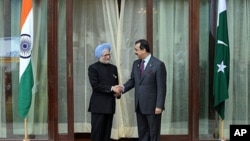India and Pakistan say they have agreed to resume stalled talks to normalize relations. The prime ministers of the neighboring rival countries met on the sidelines of a regional leaders' conference in the Himalayan kingdom of Bhutan.
Diplomats from both countries say India's Prime Minister, Manmohan Singh, and his Pakistani counterpart, Yousuf Raza Gilani, talked for about an hour - their first meeting in more than nine months. And their discussion was followed by further talks among their top diplomats.
Pakistan's Foreign Minister, Shah Mehmood Qureshi, told reporters the discussions were "warm, cordial and engaging" leading to a change of climate, which he partly credits to the setting and ambience of Bhutan.
"We have decided to move forward. We have overcome the suspension of our [negotiating] process. And that's good news for India, that's good news Pakistan, that is good news for the region," Qureshi saod.
Qureshi says, at subsequent talks among their foreign ministers and foreign secretaries, the dialogue will be "all encompassing" with every issue on the table.
Indian Foreign Secretary Nirupama Rao terms the Thimphu talks "very good" and says the two leaders agreed to have their top diplomats resume dialogue and assess why there is a lack of mutual trust between the two nuclear-armed neighbors.
The peace process has been suspended since the November 2008 terror attack on Mumbai which India blamed on Pakistani-based terrorists.
The neighbors have numerous unresolved issues, including a particularly contentious territorial dispute over Kashmir and how to share river water.
India and Pakistan have been under international pressure to resume negotiations. New Delhi has resisted, insisting it wanted to see more determination by Pakistan to take action against extremists.
This fresh diplomatic breakthrough came as leaders of eight countries concluded their annual summit of the South Asian Association of Regional Cooperation.




